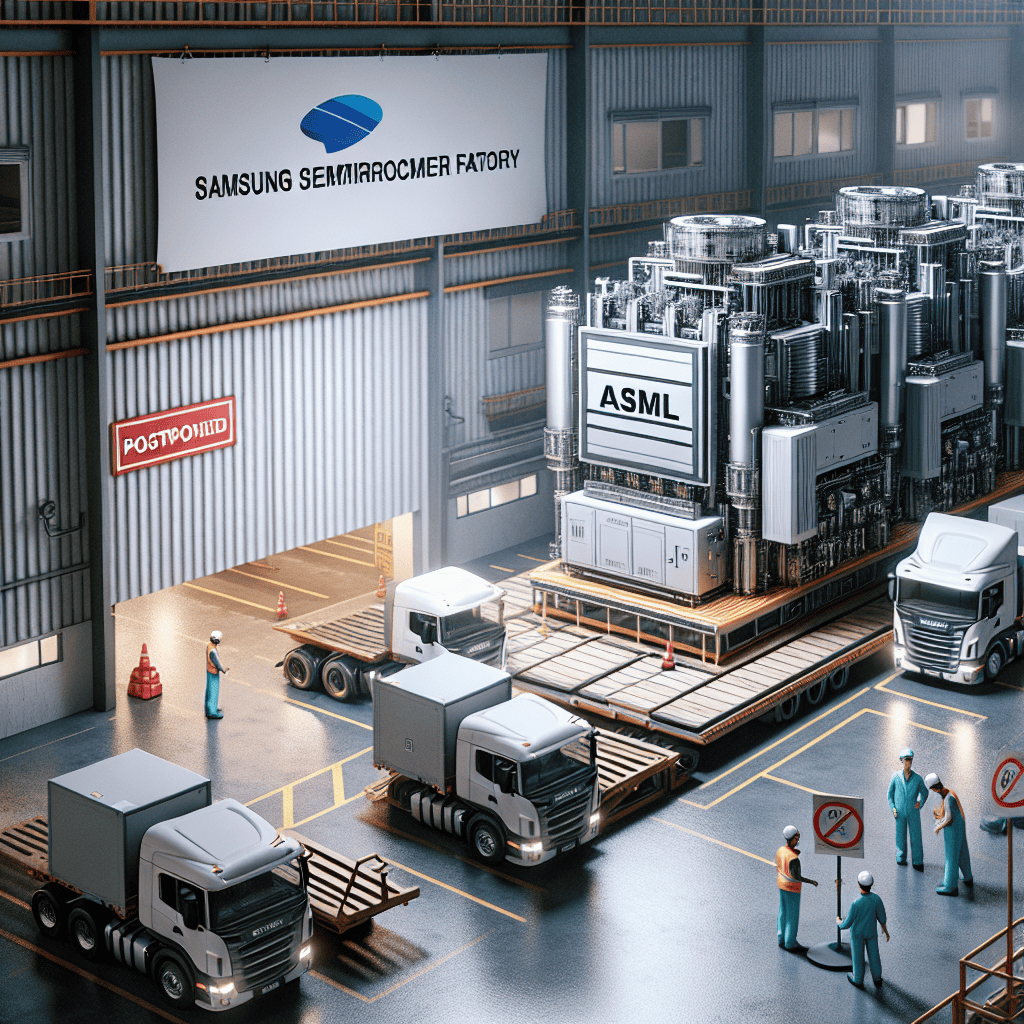“Samsung Hits Pause: ASML Equipment Delays Impact New US Factory Launch”
Introduction
Samsung has reportedly decided to delay the delivery of advanced chipmaking equipment from ASML for its new semiconductor facility in the United States, according to sources familiar with the matter. This postponement is said to be part of Samsung’s strategic adjustments in response to evolving market conditions and supply chain challenges. The equipment, crucial for the production of cutting-edge chips, is a key component in Samsung’s efforts to expand its semiconductor manufacturing capabilities on American soil. The decision underscores the complexities and uncertainties facing the global semiconductor industry, as companies navigate geopolitical tensions, technological advancements, and fluctuating demand.
Impact Of Samsung’s Decision To Postpone ASML Equipment Deliveries On The Semiconductor Industry
Samsung’s recent decision to postpone the delivery of ASML’s advanced chip-making equipment for its new factory in the United States has sent ripples through the semiconductor industry, raising questions about the potential implications for both the company and the broader market. This move, as reported by industry sources, underscores the complex dynamics at play in the global semiconductor supply chain, where strategic decisions by major players can have far-reaching consequences.
To begin with, Samsung’s decision to delay the receipt of ASML’s equipment is significant because ASML is the sole supplier of extreme ultraviolet (EUV) lithography machines, which are crucial for producing cutting-edge semiconductors. These machines enable the production of smaller, more powerful, and more efficient chips, which are in high demand across various sectors, including consumer electronics, automotive, and telecommunications. By postponing the delivery, Samsung may be signaling a shift in its production strategy or responding to broader market conditions, such as fluctuating demand or supply chain constraints.
Moreover, this postponement could impact Samsung’s competitive positioning in the semiconductor industry. As one of the leading chip manufacturers globally, Samsung’s ability to produce advanced semiconductors is critical to maintaining its market share against competitors like Taiwan Semiconductor Manufacturing Company (TSMC) and Intel. Delays in acquiring and deploying ASML’s EUV machines could potentially slow down Samsung’s production timelines, affecting its ability to meet customer demands and innovate at the pace required to stay ahead in the technology race.
In addition to affecting Samsung’s internal operations, the decision may also have broader implications for the semiconductor supply chain. The semiconductor industry is characterized by its intricate and interdependent network of suppliers, manufacturers, and customers. Any disruption or delay in one part of the chain can have cascading effects throughout the entire ecosystem. For instance, if Samsung’s production is delayed, it could lead to a ripple effect, impacting the availability of chips for various applications and potentially exacerbating the ongoing global chip shortage.
Furthermore, this development highlights the geopolitical dimensions of the semiconductor industry. With the United States and other countries seeking to bolster their domestic semiconductor manufacturing capabilities, Samsung’s new factory in the US is part of a broader trend of reshoring and diversifying supply chains. However, the postponement of ASML equipment deliveries may raise concerns about the pace and feasibility of these efforts, especially in light of the complex logistics and technical challenges involved in setting up advanced semiconductor manufacturing facilities.
In conclusion, Samsung’s decision to postpone ASML chip equipment deliveries for its new US factory is a multifaceted issue with potential implications for the company, its competitors, and the global semiconductor industry. While the immediate effects of this decision remain to be seen, it underscores the intricate and interconnected nature of the semiconductor supply chain, where strategic decisions by key players can have significant ripple effects. As the industry continues to navigate challenges such as supply chain disruptions, geopolitical tensions, and technological advancements, stakeholders will need to closely monitor developments and adapt their strategies accordingly to ensure resilience and competitiveness in this rapidly evolving landscape.
Reasons Behind Samsung’s Delay In Receiving ASML Chip Equipment For Its US Factory
Samsung’s decision to postpone the delivery of ASML chip equipment for its new factory in the United States has sparked considerable interest and speculation within the semiconductor industry. This delay, as reported by sources familiar with the matter, is not merely a logistical hiccup but rather a strategic maneuver influenced by a confluence of factors. Understanding these reasons requires a closer examination of the current landscape of the semiconductor industry, Samsung’s strategic priorities, and the broader geopolitical context.
Firstly, the semiconductor industry is currently experiencing unprecedented demand, driven by the proliferation of digital technologies and the increasing integration of chips in various sectors, from automotive to consumer electronics. This surge in demand has led to a global chip shortage, putting pressure on manufacturers to optimize their production capabilities. Samsung, as a leading player in this field, is no exception. The company is likely recalibrating its production timelines to better align with market demands and supply chain realities. By postponing the delivery of ASML’s advanced lithography equipment, Samsung may be seeking to synchronize its production capacity with the anticipated stabilization of the chip market.
Moreover, Samsung’s strategic priorities play a crucial role in this decision. The company has been aggressively expanding its semiconductor manufacturing capabilities, with significant investments in both domestic and international facilities. The new factory in the United States is a testament to Samsung’s commitment to strengthening its global footprint. However, the construction and operationalization of such a facility are complex undertakings that require meticulous planning and execution. Delaying the receipt of ASML equipment could provide Samsung with the necessary time to ensure that the factory’s infrastructure and workforce are adequately prepared to handle the sophisticated machinery, thereby minimizing potential operational disruptions.
In addition to these industry-specific and strategic considerations, the geopolitical environment cannot be overlooked. The semiconductor sector has become a focal point of international trade tensions, particularly between the United States and China. As a South Korean company with significant business interests in both countries, Samsung must navigate this delicate geopolitical landscape with caution. The decision to delay equipment delivery might be influenced by the need to assess and adapt to evolving trade policies and regulatory frameworks. By taking a measured approach, Samsung can mitigate risks associated with potential policy shifts that could impact its operations and supply chain.
Furthermore, the collaboration with ASML, a Dutch company renowned for its cutting-edge lithography technology, adds another layer of complexity. ASML’s equipment is critical for producing advanced chips, and any delay in its delivery could have implications for Samsung’s competitive positioning. However, the postponement might also reflect a mutual understanding between the two companies to optimize the timing of equipment deployment, ensuring that both parties are aligned in their operational and strategic objectives.
In conclusion, Samsung’s decision to delay the delivery of ASML chip equipment for its new US factory is a multifaceted issue shaped by industry dynamics, strategic imperatives, and geopolitical considerations. While the immediate impact of this postponement may raise questions, it is likely a calculated move aimed at positioning Samsung for long-term success in a rapidly evolving semiconductor landscape. As the company continues to navigate these complexities, its ability to adapt and respond to changing circumstances will be crucial in maintaining its leadership in the global semiconductor market.
How Samsung’s Postponement Affects The Timeline Of Its New US Factory
Samsung’s decision to postpone the delivery of ASML chip equipment for its new U.S. factory has significant implications for the timeline of the facility’s development. This delay, as reported by sources familiar with the matter, underscores the complexities and challenges inherent in the semiconductor manufacturing industry, particularly in the context of global supply chain disruptions and geopolitical tensions. The postponement is not merely a logistical issue but a strategic decision that could ripple through various facets of Samsung’s operations and the broader semiconductor market.
Initially, the new U.S. factory was poised to be a cornerstone of Samsung’s strategy to expand its semiconductor manufacturing capabilities outside of South Korea. The facility, which is part of a broader $17 billion investment plan, was expected to enhance Samsung’s ability to meet the growing demand for advanced chips, particularly in the wake of the global chip shortage. However, the delay in receiving ASML’s cutting-edge lithography machines, which are crucial for producing the most advanced semiconductors, could push back the factory’s operational timeline. This postponement may affect Samsung’s competitive positioning, especially as rivals like TSMC and Intel are also ramping up their production capacities in the United States.
Moreover, the delay highlights the intricate dependencies within the semiconductor supply chain. ASML, a Dutch company, is the sole supplier of extreme ultraviolet (EUV) lithography machines, which are essential for manufacturing the latest generation of chips. Any disruption in the delivery of these machines can have cascading effects on production schedules. Samsung’s decision to delay the equipment’s arrival could be influenced by several factors, including the current state of global supply chains, which have been strained by the COVID-19 pandemic and geopolitical tensions, particularly between the U.S. and China. These tensions have led to increased scrutiny and regulation of technology transfers, potentially complicating the logistics of equipment delivery.
Furthermore, the postponement may also reflect Samsung’s strategic recalibration in response to evolving market conditions. The semiconductor industry is characterized by rapid technological advancements and fluctuating demand patterns. By delaying the equipment delivery, Samsung might be seeking to align its production capabilities more closely with anticipated market needs, thereby optimizing its investment in the new facility. This strategic pause could allow Samsung to better assess the competitive landscape and adjust its production strategies accordingly.
In addition to affecting Samsung’s operational timeline, the delay could have broader implications for the U.S. semiconductor industry. The U.S. government has been actively encouraging domestic semiconductor manufacturing to reduce reliance on foreign suppliers and enhance national security. Samsung’s new factory is a critical component of this initiative, and any delays could impact the overall progress of bolstering U.S. chip production capabilities. Consequently, stakeholders, including policymakers and industry leaders, will be closely monitoring the situation to assess its potential impact on the U.S. semiconductor ecosystem.
In conclusion, Samsung’s postponement of ASML chip equipment deliveries for its new U.S. factory is a multifaceted issue with implications that extend beyond mere logistical challenges. It reflects the complex interplay of strategic decision-making, supply chain dynamics, and geopolitical considerations that define the semiconductor industry today. As Samsung navigates these challenges, the industry will be watching closely to see how this decision influences the company’s future trajectory and the broader landscape of global semiconductor manufacturing.
The Role Of ASML In Samsung’s Chip Manufacturing Strategy

Samsung’s decision to postpone the delivery of ASML’s chip-making equipment for its new U.S. factory has sparked considerable interest and speculation within the semiconductor industry. ASML, a Dutch company, is renowned for its cutting-edge lithography machines, which are crucial for producing advanced semiconductor chips. These machines are integral to Samsung’s strategy to maintain its competitive edge in the global chip market. By understanding the role of ASML in Samsung’s chip manufacturing strategy, one can appreciate the implications of this delay.
ASML’s lithography machines, particularly the extreme ultraviolet (EUV) lithography systems, are pivotal in the production of high-performance chips. These machines enable the creation of smaller, more efficient, and more powerful semiconductors, which are essential for a wide range of applications, from smartphones to data centers. Samsung, as a leading player in the semiconductor industry, relies heavily on ASML’s technology to produce chips that meet the ever-increasing demands for performance and efficiency. Consequently, any delay in acquiring these machines can have significant repercussions on Samsung’s production timelines and market competitiveness.
The postponement of ASML equipment deliveries to Samsung’s new U.S. factory may be attributed to several factors. One possible reason is the ongoing global supply chain disruptions, which have affected numerous industries, including semiconductor manufacturing. These disruptions can lead to delays in the production and delivery of critical components, such as ASML’s lithography machines. Additionally, the complexity and precision required in manufacturing these machines mean that even minor setbacks can result in significant delays.
Moreover, Samsung’s strategic considerations may also play a role in this decision. The company might be reassessing its production schedules and capacity requirements in light of changing market conditions and demand forecasts. By postponing the delivery of ASML equipment, Samsung could be aiming to align its production capabilities more closely with anticipated market needs, thereby optimizing its resource allocation and investment strategies.
Furthermore, the geopolitical landscape cannot be overlooked when analyzing this development. The semiconductor industry is increasingly influenced by international trade policies and relations, particularly between major economies such as the United States and China. Samsung’s decision to build a new factory in the U.S. is likely influenced by these geopolitical dynamics, as the company seeks to diversify its manufacturing footprint and mitigate risks associated with trade tensions. Delaying the delivery of ASML equipment could be a strategic move to navigate these complex geopolitical waters more effectively.
In addition to these factors, Samsung’s internal priorities and technological roadmaps may also impact the timing of ASML equipment deliveries. The company is continuously innovating and developing new technologies to stay ahead in the competitive semiconductor market. As such, Samsung may be adjusting its timelines to ensure that its new U.S. factory is equipped with the latest and most advanced lithography machines available, thereby maximizing its technological capabilities and production efficiency.
In conclusion, the postponement of ASML chip equipment deliveries to Samsung’s new U.S. factory is a multifaceted issue with implications for both companies and the broader semiconductor industry. By examining the role of ASML in Samsung’s chip manufacturing strategy, it becomes evident that this decision is influenced by a combination of supply chain challenges, strategic considerations, geopolitical factors, and technological priorities. As the situation unfolds, industry stakeholders will be closely monitoring developments to assess their impact on the global semiconductor landscape.
Potential Consequences For The US Tech Sector Due To Samsung’s Equipment Delay
Samsung’s decision to postpone the delivery of ASML chip-making equipment for its new factory in the United States has sparked considerable discussion within the tech sector. This delay, while seemingly a logistical issue, could have far-reaching implications for the US technology landscape. As the global demand for semiconductors continues to surge, any disruption in the supply chain can have cascading effects on various industries reliant on these critical components.
To begin with, the delay in equipment delivery could potentially slow down the production timeline for Samsung’s new facility. This factory, once operational, is expected to play a pivotal role in bolstering the US semiconductor manufacturing capacity. By postponing the arrival of ASML’s advanced lithography machines, Samsung may face setbacks in meeting its production targets. Consequently, this could lead to a shortfall in the availability of semiconductors, which are essential for a wide array of products ranging from consumer electronics to automotive systems.
Moreover, the delay could impact the competitive dynamics within the semiconductor industry. The US has been striving to reduce its dependency on foreign semiconductor manufacturing, aiming to enhance its domestic production capabilities. Samsung’s new factory is a significant part of this strategy. However, any postponement in its operational readiness could hinder these efforts, potentially allowing other global players to strengthen their market positions. This scenario could be particularly concerning for US-based companies that rely on a steady supply of semiconductors to maintain their competitive edge.
In addition to affecting production timelines and competitive dynamics, the delay might also influence the broader economic landscape. The semiconductor industry is a critical driver of economic growth, contributing significantly to job creation and technological innovation. A delay in Samsung’s factory operations could slow down the anticipated economic benefits, affecting not only the tech sector but also the broader economy. This could be particularly impactful in regions where the factory is expected to generate employment and stimulate local economies.
Furthermore, the delay could have implications for the ongoing global semiconductor shortage. The pandemic-induced supply chain disruptions have already strained the availability of semiconductors, leading to production halts and increased costs across various industries. Samsung’s new factory was seen as a potential alleviation to these shortages. However, with the postponement of equipment deliveries, the timeline for relief may be extended, prolonging the challenges faced by industries dependent on these components.
On a more strategic level, the delay might prompt policymakers and industry leaders to reassess their approaches to supply chain resilience. The semiconductor industry is highly complex and interdependent, with various stages of production spread across different regions. This incident underscores the importance of having robust contingency plans and diversified supply chains to mitigate the impact of unforeseen disruptions.
In conclusion, while Samsung’s postponement of ASML chip equipment deliveries may appear as a singular event, its potential consequences for the US tech sector are multifaceted. From affecting production timelines and competitive dynamics to influencing economic growth and supply chain strategies, the ripple effects of this delay could be significant. As the situation unfolds, stakeholders across the industry will need to closely monitor developments and adapt their strategies to navigate the challenges and opportunities that arise.
Analyzing The Financial Implications Of Samsung’s Postponed Equipment Deliveries
Samsung’s decision to postpone the delivery of ASML chip equipment for its new U.S. factory has sparked considerable discussion within the financial and technological sectors. This move, while strategic, carries significant financial implications that warrant a closer examination. The delay in equipment delivery is not merely a logistical adjustment but a decision that could influence Samsung’s market position, financial performance, and competitive edge in the semiconductor industry.
To begin with, the postponement may impact Samsung’s capital expenditure plans. The acquisition of ASML’s advanced lithography machines represents a substantial investment, and any delay in their deployment could alter the company’s financial forecasts. By deferring these deliveries, Samsung might temporarily reduce its capital outlay, potentially freeing up resources for other strategic initiatives or operational needs. However, this could also mean a delay in the anticipated returns from the new factory, as the production timeline is likely to be affected.
Moreover, the delay could have repercussions on Samsung’s revenue projections. The new U.S. factory is a critical component of Samsung’s strategy to expand its semiconductor manufacturing capabilities and meet the growing demand for advanced chips. Any postponement in the factory’s operational timeline could result in missed opportunities in capturing market share, especially in a highly competitive landscape where time-to-market is crucial. Consequently, this could affect Samsung’s ability to capitalize on the burgeoning demand for semiconductors, potentially impacting its revenue growth in the short to medium term.
In addition to revenue implications, the delay might influence Samsung’s relationships with its clients and partners. The semiconductor industry is characterized by intricate supply chains and tight production schedules. Any disruption in Samsung’s production capabilities could have a cascading effect on its clients, who rely on timely delivery of chips for their own manufacturing processes. This could strain relationships and prompt clients to seek alternative suppliers, thereby affecting Samsung’s market position and long-term partnerships.
Furthermore, the decision to postpone equipment deliveries could be interpreted as a strategic maneuver in response to broader industry dynamics. The semiconductor sector is currently facing challenges such as supply chain disruptions, geopolitical tensions, and fluctuating demand patterns. By delaying the equipment delivery, Samsung might be positioning itself to better navigate these uncertainties, ensuring that its investments align with market conditions and future demand forecasts. This strategic flexibility could ultimately safeguard Samsung’s financial health and competitive standing.
On the other hand, the postponement could also signal potential challenges in Samsung’s expansion plans. Delays in equipment delivery might indicate logistical or operational hurdles that need to be addressed. If not managed effectively, these challenges could escalate, leading to increased costs and further delays. Therefore, it is crucial for Samsung to implement robust contingency plans and maintain clear communication with stakeholders to mitigate any adverse effects.
In conclusion, while the postponement of ASML chip equipment deliveries for Samsung’s new U.S. factory presents certain financial challenges, it also offers an opportunity for strategic recalibration. The decision underscores the complex interplay between operational logistics, market dynamics, and financial strategy in the semiconductor industry. As Samsung navigates this postponement, its ability to adapt and respond to evolving conditions will be pivotal in maintaining its leadership position and achieving long-term financial success.
Future Prospects For Samsung’s US Factory Amid Equipment Delivery Challenges
Samsung’s ambitious plans to expand its semiconductor manufacturing capabilities in the United States have encountered a significant hurdle, as the company has reportedly postponed the delivery of crucial chip-making equipment from ASML. This development, according to sources familiar with the matter, could have implications for the timeline and future prospects of Samsung’s new factory in Texas. The delay in equipment delivery underscores the complexities and challenges that global supply chains face, particularly in the high-tech sector, where precision and timing are paramount.
ASML, a Dutch company, is the sole supplier of extreme ultraviolet (EUV) lithography machines, which are essential for producing advanced semiconductor chips. These machines are critical for Samsung’s strategy to compete with other industry giants like TSMC and Intel in the race to produce smaller, more efficient chips. The postponement of these deliveries could potentially delay the factory’s operational timeline, which was initially slated to begin production in the coming years. This delay raises questions about Samsung’s ability to meet its production targets and fulfill its commitments to customers who rely on its cutting-edge technology.
Moreover, the delay in equipment delivery is not an isolated issue but rather part of a broader context of supply chain disruptions that have affected various industries worldwide. The semiconductor industry, in particular, has been grappling with shortages and logistical challenges exacerbated by the COVID-19 pandemic, geopolitical tensions, and increased demand for electronic devices. These factors have collectively strained the supply chain, making it difficult for companies like Samsung to adhere to their planned schedules.
In light of these challenges, Samsung’s strategic decisions regarding its US factory will be closely watched by industry analysts and stakeholders. The company has invested heavily in this facility, which is expected to play a crucial role in its global manufacturing network. The factory is not only a testament to Samsung’s commitment to expanding its presence in the US market but also a response to the growing demand for locally produced semiconductors. As such, any delays in its operational timeline could have ripple effects on Samsung’s market position and its ability to capitalize on the burgeoning demand for advanced chips.
Nevertheless, Samsung remains optimistic about the long-term prospects of its US factory. The company is likely to leverage its extensive experience and resources to mitigate the impact of the equipment delivery delay. This may involve exploring alternative strategies, such as adjusting production schedules or sourcing additional equipment from other suppliers, to ensure that the factory can commence operations as soon as possible. Furthermore, Samsung’s commitment to innovation and technological advancement positions it well to navigate these challenges and maintain its competitive edge in the semiconductor industry.
In conclusion, while the postponement of ASML chip equipment deliveries presents a significant challenge for Samsung’s new US factory, it also highlights the broader issues facing the semiconductor industry. The company’s ability to adapt to these challenges will be crucial in determining the future success of its US operations. As Samsung continues to navigate this complex landscape, its strategic decisions will undoubtedly shape the trajectory of its growth and influence the global semiconductor market.
Q&A
1. **What is the main reason for Samsung postponing ASML chip equipment deliveries?**
Samsung is reportedly postponing ASML chip equipment deliveries due to delays in the construction of its new semiconductor manufacturing facility in the United States.
2. **Which company is affected by the postponement of equipment deliveries?**
ASML, a Dutch company that supplies advanced lithography equipment for semiconductor manufacturing, is affected by the postponement.
3. **Where is Samsung’s new factory located?**
Samsung’s new semiconductor manufacturing facility is located in Taylor, Texas, USA.
4. **What type of equipment is being delayed?**
The equipment being delayed is advanced lithography machines used in the production of semiconductor chips.
5. **How might this postponement impact Samsung’s production timeline?**
The postponement could potentially delay the start of production at the new facility, affecting Samsung’s timeline for increasing its semiconductor manufacturing capacity.
6. **What is the significance of ASML’s equipment in semiconductor manufacturing?**
ASML’s equipment is crucial for producing advanced semiconductor chips, as it enables the creation of smaller and more efficient chip designs through extreme ultraviolet (EUV) lithography.
7. **Has Samsung provided a new timeline for the equipment delivery and factory completion?**
As of the latest reports, Samsung has not publicly provided a revised timeline for the equipment delivery or the completion of the factory.
Conclusion
Samsung’s decision to postpone the delivery of ASML chip equipment for its new U.S. factory highlights the complexities and challenges in the semiconductor supply chain and manufacturing expansion. This delay could impact Samsung’s timeline for increasing its chip production capacity, potentially affecting its competitive position in the global market. The postponement may be attributed to logistical issues, strategic reassessments, or broader industry disruptions. As Samsung navigates these challenges, the situation underscores the importance of flexibility and adaptability in the rapidly evolving semiconductor industry.





